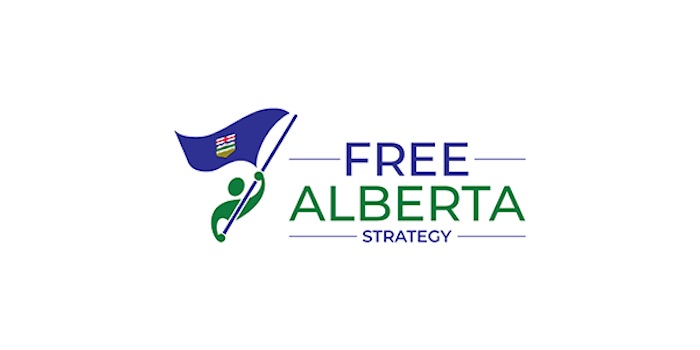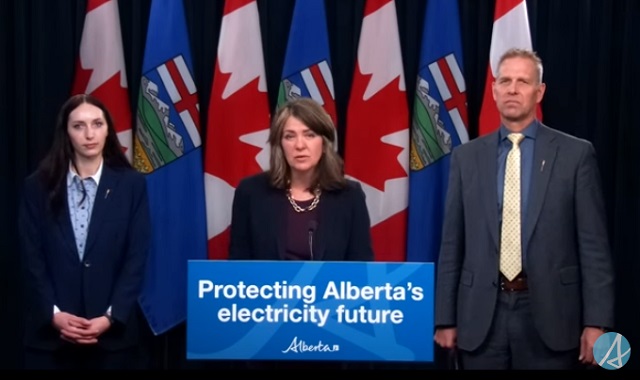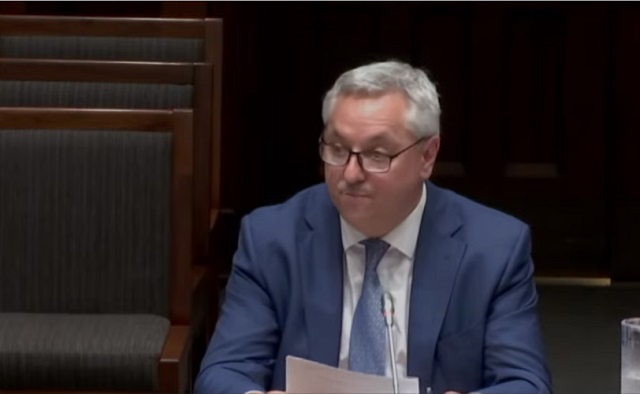Alberta
Group behind the Alberta Sovereignty Act pleased with Province’s strategy

Submitted by Free Alberta Strategy
The Alberta Sovereignty Within A United Canada Act – the new full name for the Sovereignty Act – was introduced to the Alberta Legislature on Tuesday.
Now that we’ve had a short while to digest it, we’re confident in saying that when it comes to protecting the interests of Alberta on the national stage, the Act is right on the money.
The Sovereignty Act, in practicality, is just a procedural bill – more or less just a framework for a free vote in the Legislature. It allows for a Cabinet Minister to introduce a motion about a “federal initiative” that the Minister believes to be unconstitutional on the basis of intruding into an area of provincial constitutional jurisdiction, or is otherwise harmful to Albertans, such as by violating Albertans’ rights and freedoms under the Charter of Rights and Freedoms.
The resolution would identify not only the “federal initiative” that is being addressed, but also specific “measures” that the government may use to push back.
The motion would then be debated on the floor of the Legislature, followed by a free vote of MLAs and – if the majority vote is in favour – the passage of the motion.
At this point, Cabinet is then tasked with implementing the specific “measures” identified in the motion.
The usual suspects have continued to claim that it’s unconstitutional for Alberta to insist that the federal government follow the constitution, and to refuse to help them enforce their laws when they don’t.
This was always a strange argument, but even more so now, given the bill explicitly says, right near the start:
Nothing in this Act is to be construed as (a) authorizing any order that would be contrary to the Constitution of Canada.
Some, however, have now finally come to understand the Strategy.
Take the National Post’s Carson Jerema, for example, who – just a few months ago – was attacking the Sovereignty Act.
Yesterday, he got behind it, in a piece entitled: “Surprise, Danielle Smith’s sovereignty act is very likely constitutional“…
This is hardly the Constitution-breaking plan, which Smith’s critics, myself included, warned about during her campaign for the UCP leadership. The characterization of the sovereignty act as a threat to the rule of law, which some critics are still expounding, is simply wrong. Jesse Hartery, a Toronto lawyer with expertise in federalism, says he has been frustrated by the debate around the sovereignty act because the proposal, as currently written “appears to be constitutional,” based on existing law.
“One government can seek assistance from the other, can co-operate with the other, but they can’t require the other to implement and enforce their laws,” he told me by phone Wednesday morning. “So the (Supreme) Court has never endorsed that, and in fact, there’s decisions where the court says: there’s no positive obligation on a province or the federal government to co-operate with the other.”
Of course, for those of you who’ve been following our work for a while, it’s not at all a surprise that the Sovereignty Act is constitutional!
It’s not a surprise to us, because this has been our argument for over a year – one that we’ve repeatedly explained in these emails, on social media, on traditional media, in virtual town halls, physical events, and more.
Provinces have always had the right to refuse to endorse federal laws, and to do so is not contrary to the Constitution of Canada.
The reality is that the attacks are nothing but political theatre from a group of politicians and critics that have been missing the mark on western alienation for years now.
We’ve seen how far the federal government is willing to go to impose their Laurentian views on the rest of the country. They’ve made a mockery of the political system over the past eight years, launching an all-out war on our energy industry that has landlocked our resources and destroyed our livelihoods. We all remember the dark days when unemployment was the highest in the country, debts were coming due, and suicide rates were high. None of us want to relive that.
The Sovereignty Act is absolutely necessary, and the fact that the Sovereignty Act is Bill 1 demonstrates that this new government has put standing up to federal overreach at the top of the priority list.
Its introduction has already caught the attention of the federal government, with Prime Minister Justin Trudeau saying that he isn’t “looking for a fight,” over the Sovereignty Act.
In his comments, there appears to be some awareness that bringing the hammer down on Alberta over this legislation would create potential issues in Quebec and Saskatchewan, with both provincial governments undoubtedly monitoring the situation in Edmonton closely.
The Alberta Sovereignty Within A United Canada Act has a purpose – to give Alberta a tool to protect against federal intrusions into provincial affairs. In passing this Bill, it appears that Premier Danielle Smith and her team hit all the right notes.
*****
If you want us to keep fighting for a strong and free Alberta, please make a contribution now to fund our efforts:
| CLICK HERE TO HELP |
If you’re not in a position to contribute right now, we understand, but please consider signing up as a volunteer to help spread the word.
Alberta
Alberta government should create flat 8% personal and business income tax rate in Alberta

From the Fraser Institute
By Tegan Hill
If the Smith government reversed the 2015 personal income tax rate increases and instituted a flat 8 per cent tax rate, it would help restore Alberta’s position as one of the lowest tax jurisdictions in North America
Over the past decade, Alberta has gone from one of the most competitive tax jurisdictions in North America to one of the least competitive. And while the Smith government has promised to create a new 8 per cent tax bracket on personal income below $60,000, it simply isn’t enough to restore Alberta’s tax competitiveness. Instead, the government should institute a flat 8 per cent personal and business income tax rate.
Back in 2014, Alberta had a single 10 per cent personal and business income tax rate. As a result, it had the lowest top combined (federal and provincial/state) personal income tax rate and business income tax rate in North America. This was a powerful advantage that made Alberta an attractive place to start a business, work and invest.
In 2015, however, the provincial NDP government replaced the single personal income tax rate of 10 percent with a five-bracket system including a top rate of 15 per cent, so today Alberta has the 10th-highest personal income tax rate in North America. The government also increased Alberta’s 10 per cent business income tax rate to 12 per cent (although in 2019 the Kenney government began reducing the rate to today’s 8 per cent).
If the Smith government reversed the 2015 personal income tax rate increases and instituted a flat 8 per cent tax rate, it would help restore Alberta’s position as one of the lowest tax jurisdictions in North America, all while saving Alberta taxpayers $1,573 (on average) annually.
And a truly integrated flat tax system would not only apply a uniform tax 8 per cent rate to all sources of income (including personal and business), it would eliminate tax credits, deductions and exemptions, which reduce the cost of investments in certain areas, increasing the relative cost of investment in others. As a result, resources may go to areas where they are not most productive, leading to a less efficient allocation of resources than if these tax incentives did not exist.
Put differently, tax incentives can artificially change the relative attractiveness of goods and services leading to sub-optimal allocation. A flat tax system would not only improve tax efficiency by reducing these tax-based economic distortions, it would also reduce administration costs (expenses incurred by governments due to tax collection and enforcement regulations) and compliance costs (expenses incurred by individuals and businesses to comply with tax regulations).
Finally, a flat tax system would also help avoid negative incentives that come with a progressive marginal tax system. Currently, Albertans are taxed at higher rates as their income increases, which can discourage additional work, savings and investment. A flat tax system would maintain “progressivity” as the proportion of taxes paid would still increase with income, but minimize the disincentive to work more and earn more (increasing savings and investment) because Albertans would face the same tax rate regardless of how their income increases. In sum, flat tax systems encourage stronger economic growth, higher tax revenues and a more robust economy.
To stimulate strong economic growth and leave more money in the pockets of Albertans, the Smith government should go beyond its current commitment to create a new tax bracket on income under $60,000 and institute a flat 8 per cent personal and business income tax rate.
Author:
Alberta
Province to stop municipalities overcharging on utility bills

Making utility bills more affordableAlberta’s government is taking action to protect Alberta’s ratepayers by introducing legislation to lower and stabilize local access fees. Affordability is a top priority for Alberta’s government, with the cost of utilities being a large focus. By introducing legislation to help reduce the cost of utility bills, the government is continuing to follow through on its commitment to make life more affordable for Albertans. This is in addition to the new short-term measures to prevent spikes in electricity prices and will help ensure long-term affordability for Albertans’ basic household expenses.
Local access fees are functioning as a regressive municipal tax that consumers pay on their utility bills. It is unacceptable for municipalities to be raking in hundreds of millions in surplus revenue off the backs of Alberta’s ratepayers and cause their utility bills to be unpredictable costs by tying their fees to a variable rate. Calgarians paid $240 in local access fees on average in 2023, compared to the $75 on average in Edmonton, thanks to Calgary’s formula relying on a variable rate. This led to $186 million more in fees being collected by the City of Calgary than expected.
To protect Alberta’s ratepayers, the Government of Alberta is introducing the Utilities Affordability Statutes Amendment Act, 2024. If passed, this legislation would promote long-term affordability and predictability for utility bills by prohibiting the use of variable rates when calculating municipalities’ local access fees. Variable rates are highly volatile, which results in wildly fluctuating electricity bills. When municipalities use this rate to calculate their local access fees, it results in higher bills for Albertans and less certainty in families’ budgets. These proposed changes would standardize how municipal fees are calculated across the province, and align with most municipalities’ current formulas.
If passed, the Utilities Affordability Statutes Amendment Act, 2024 would prevent municipalities from attempting to take advantage of Alberta’s ratepayers in the future. It would amend sections of the Electric Utilities Act and Gas Utilities Act to ensure that the Alberta Utilities Commission has stronger regulatory oversight on how these municipal fees are calculated and applied, ensuring Alberta ratepayer’s best interests are protected.
If passed, this legislation would also amend sections of the Alberta Utilities Commission Act, the Electric Utilities Act, Government Organizations Act and the Regulated Rate Option Stability Act to replace the terms “Regulated Rate Option”, “RRO”, and “Regulated Rate Provider” with “Rate of Last Resort” and “Rate of Last Resort Provider” as applicable. Quick facts
Related information |
-

 Business2 days ago
Business2 days agoMaxime Bernier warns Canadians of Trudeau’s plan to implement WEF global tax regime
-

 Frontier Centre for Public Policy2 days ago
Frontier Centre for Public Policy2 days agoThe tale of two teachers
-

 International1 day ago
International1 day agoUN attacks stay-at-home motherhood as ‘gender inequality’
-

 Censorship Industrial Complex8 hours ago
Censorship Industrial Complex8 hours agoDesperate Liberals move to stop MPs from calling Trudeau ‘corrupt’
-

 COVID-191 day ago
COVID-191 day agoWHO Official Admits the Truth About Passports
-

 Alberta1 day ago
Alberta1 day agoProvince to stop municipalities overcharging on utility bills
-

 Energy1 day ago
Energy1 day agoAnti-LNG activists have decided that they now actually care for LNG investors after years of calling to divest
-

 Alberta15 hours ago
Alberta15 hours agoAlberta government should create flat 8% personal and business income tax rate in Alberta









